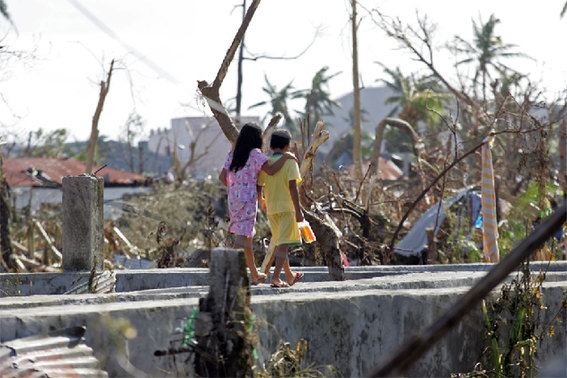Long-term aid needed for Philippines typhoon victims
 0 Comment(s)
0 Comment(s) Print
Print E-mail China.org.cn, November 22, 2013
E-mail China.org.cn, November 22, 2013
As food aid reached nearly 2.7 million survivors of Typhoon Haiyan, which devastated the central Philippines earlier this month, the top United Nations emergency relief official warned today that millions of people left without homes will require substantial longer-term support.
 |
|
Two children walk past downed trees and other destruction caused by Super Typhoon Haiyan in Tacloban City. [Photo: UNICEF] |
UN Humanitarian Coordinator Valerie Amos, on her second visit to the crisis area in a week, called on the international community to ensure that the homeless are provided with the means to rebuild their houses.
According to latest estimates Haiyan killed several thousand people and affected 13.25 million overall, including 5.4 million children, many of whom face serious protection, health and safety risks. Some 4.4 million were displaced and 2.5 million are in need of food aid. More than 387,000 people are staying in evacuation centres across the six affected regions.
At the end of a three-day visit, Ms. Amos welcomed the strong coordination among the international community, including partners and military assistance from Member States, in support of national and local responders to address the immediate needs. A mass vaccination campaign for measles, Vitamin A and polio is set to start on Monday.
The Government and the UN World Food Programme (WFP) have distributed food to nearly 2.7 million people, and funding for the humanitarian appeal launched last week stands at nearly 43 per cent, or $129 million.
Looking to the future, the Philippines today launched a new "Safe Schools" campaign with the UN Office for Disaster Risk Reduction (UNISDR), designed to raise public awareness and build social demand for safety checks, disaster preparedness, and school education on disaster risk reduction.
Thousands of children are unable to return to education because over 600 schools have been destroyed and 1.7 million children have lost their homes.
"The Philippines can emerge from the tragedy of Typhoon Haiyan as a world leader in safe schools by bringing its experience of implementing this programme to the World Conference on Disaster Risk Reduction in 2015 when a global campaign will be launched," UNISDR Head Margareta Wahlstr?m said.
"There is an opportunity now as rebuilding gets underway. We must see a paradigm shift away from simply building back better to building back differently and elsewhere. Build in safe locations and build high enough to withstand storm surges."
Meanwhile it was James Bond to the rescue at the UN Children's Fund (UNICEF) humanitarian supply warehouse in Copenhagen, Denmark, when British actor Sir Roger Moore, most famously known as the super agent licensed to kill, dropped in for a visit.
But it was not as 007 that Sir Roger came by the warehouse where staff has been shipping out life-saving supplies at full force since Haiyan hit, but as UNICEF Goodwill Ambassador, with a call for continued support for children and their families in the Philippines.
"There are some five million children who need help – nearly half of them have lost their homes and some are separated from their parents," he said. "We are dealing with families spread across 1,500 emergency camps. Many, many people have lost simply everything but their lives."
In the past two weeks, UNICEF has sent 240 metric tonnes of life-saving supplies from its warehouses in Copenhagen and Dubai.





